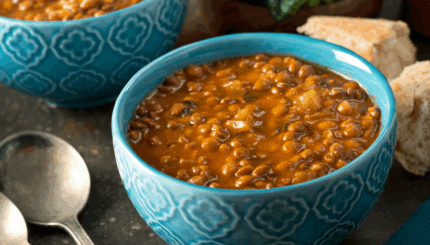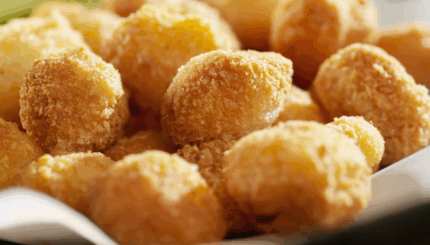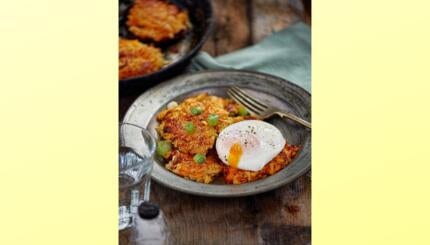The pandemic hit Melina Schein, an opera singer, vocal coach, director, and producer based in Western Canada, hard. Shows were cancelled — she was due to go on a national Andrew Lloyd Webber tour and was producing a local performance of Cabaret — and days stretched out before her. Schein allowed herself a month to wallow on the couch, then decided to take action. She’d dreamt of becoming a writer, chef, or performer since childhood, and since performing wasn’t an option, she merged writer and chef in a multifaceted culinary project.
The kitchen had always been a place of refuge and creativity for Schein, as well as a connection to Judaism. Her father was a keen cook who had introduced her to Israeli, Turkish, and Moroccan dishes; her mother had an Ashkenazi background and repertoire. Now with unforeseen spare time, Schein sought to learn more about the breadth and depth of global Jewish cuisine.
After careful research, Schein opted to cook her way through prolific writer and author Leah Koenig’s The Jewish Cookbook, published in 2019 — all 400+ recipes — from start to finish in the space of a year. Koenig’s straightforward prose, succinct history of each dish, and comprehensive collection of recipes appealed to Schein. It reads, she explained to me, “like an encyclopedia,” and left room to insert herself into each dish.
I chatted to Schein for 30 minutes but could have continued for hours. Her warmth and enthusiasm — for this project and for life — is evident on her blog, The Saucy Soprano, and Instagram profile of the same name, where she shares the dish/es she’s tackled that day, documenting her efforts with signature bawdy humor and candid recollections. What I learnt from talking to her was how driven and committed Schein is. Cooking is only half the battle (oh, and did I mention she’s a pescatarian and only has a taste of the multiple meat dishes in the book); she researches each dish extensively before writing her review, “I want to know everything there is to know about these dishes,” she told me. She also hosts a podcast, Saucy Talk, gathering “friends and colleagues from around the world for good gabbing, fabulous food and memories of music to turn Covid on its tuchis!”
The Nosher celebrates the traditions and recipes that have brought Jews together for centuries. Donate today to keep The Nosher's stories and recipes accessible to all.
Koenig actually featured on Schein’s podcast, after catching wind of the project around halfway through. Having invested so much time and toil researching, writing, and testing for The Jewish Cookbook, which Koenig views as a culmination of over a decade of writing on Jewish food, it is gratifying, she told me, to see it used and treasured.
Schein is not the first to blog an attempt to cook through a seminal cookbook. Julie Powell started the trend in 2002 with renowned chef Julia Child’s Mastering the Art of French Cooking. Her blog was later turned into a book, then inspired the movie Julie and Julia, starring Meryl Streep as Julia Child and Amy Adams as Powell. Although Schein saw the movie, she didn’t know about the blog; rather, this project was driven by her desire to understand and connect with global Jewish food. Plus, Schein pointed out to me, unlike Powell, she can contact Koenig — she does so fairly regularly regarding ingredient substitutions or if a dish doesn’t turn out quite right — and considers her a friend.
The parallels are more significant to Koenig, who read Powell’s blog and closely followed what was, at the time, her highly original venture. Is it strange, I asked, to now be on the other side of the story? Julia Child was famously unimpressed with Powell’s venture, commenting “I don’t think she’s a serious cook.”
“There are actually two other people that I know of doing the same thing, though in a much less official capacity,” Koenig informed me. “I’m honored… after this is all over, I’d love to meet Melina in person for a coffee.”
Koenig continues to cook widely from The Jewish Cookbook, making challah regularly and turning to kugelhopf, an Alsatian yeasted bundt cake studded with almonds and dried fruit that’s similar to Italian panettone, for a treat, “It requires a special pan, but it’s totally worth it.”
As for Schein, her recipe rating system — each dish receives one to five matzah balls — means she’ll find it easy to return to the dishes she enjoyed the most once the project is over. One that instantly comes to mind is a German Shabbat bread called berches, an eggless challah made with potatoes. “You add mashed — MASHED! — potatoes and it gives it this incredibly soft texture,” Schein told me, excitedly (seriously, give this woman a QVC slot because she could sell anything). Fattoush, a Lebanese bread salad made with leftover pita was also awarded an elusive five matzah balls. It’s “the sort of salad I live for, dream about, enact naughty little vegetable fantasies over,” wrote Schein, on her blog.
And recipes she won’t be returning to? The first one she attempted: huevos haminados (Sephardic slow-cooked eggs), which she said tasted faintly of the onion skins and coffee grounds they were cooked in. I couldn’t help but put in a good word, explaining that they aren’t usually eaten in isolation, and are excellent alongside a large, coiled boureka, which Schein conceded did sound delicious and worthy of another try.
When Schein was told that entertainers and artists were considered non-essential workers at the start of the pandemic “it was very hard.” Schein knew she needed to find a new reason to get up each morning that felt essential — she calls Koenig’s book her “raison d’être” — and compelled her to create and entertain an audience every day. Anyone finding themselves in a similar slump — pandemic-related or not — can learn a lesson from Schein.
“Keep creating,” she advised. “Whatever it is, however it takes shape, even if it looks nothing like it did previously or even how you anticipated it looking.” Find your reason, commit to it, and embrace the new directions it takes you.



